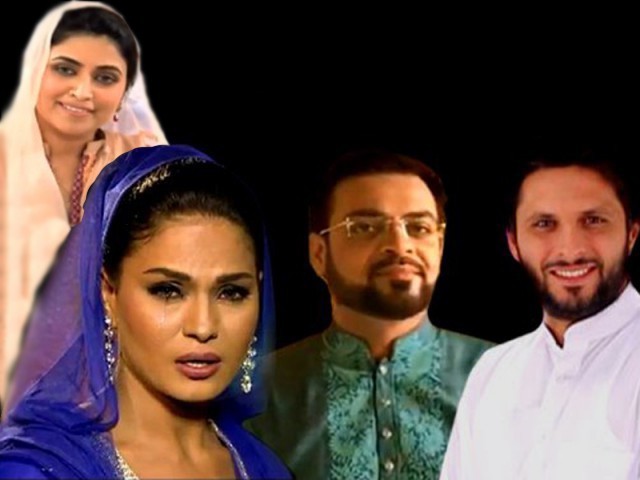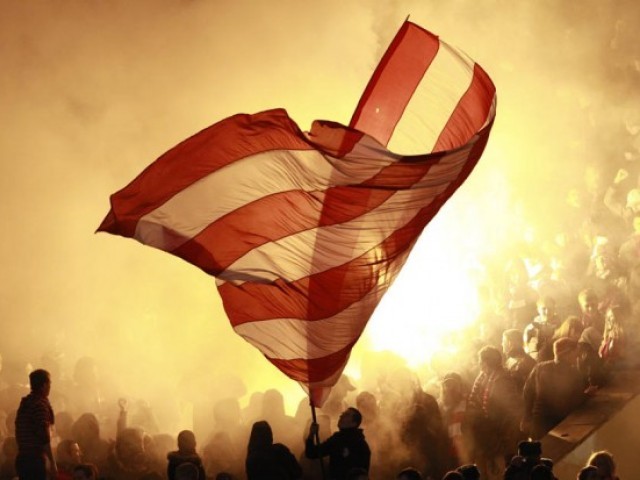Lets love Pakistan: a new resolution (VI)
18 minutes ago
Whatever we are, we’re mighty proud of it—just like we should be! PHOTO: AFP
Finally, after months of struggle and heaps of
derision and negativity, I complete the challenge I laid out for myself
last year: to compile a list of 65 things that make Pakistan so special.
I don’t know if I’m taking much away from this seemingly futile
exercise, but one thing is certain: in a small, feel-good way, I think
it has served its purpose by rekindling that flickering flame of
patriotism and respect for the one certain thing in my life that is my
country, my home, my Pakistan.
My dear Pakistan, may you live long and prosper.
51. The new wave of local English literati:
Pakistan had always been blessed with some great
Urdu writers, but the country has recently started churning out a rather
impressive squad of young English authors that have accrued much local
and international interest. They have won rave reviews the world over,
and in one much celebrated case, evening scoring a larger-than-life
Hollywood movie deal. Bring on the local literature festivals!
 52. Pakistan Armed Forces:
52. Pakistan Armed Forces:
The seventh largest military force in the world in terms of active
troops, Pakistan Armed Forces—which includes Pakistan Army, Pakistan
Navy and Pakistan Air Force—have kept us safe and out of harm’s way
through four full-fledged wars. It has also countered countless other
polarised conflicts since our independence in 1947, and it’s time we get
off our high horse and pay due respect to the thousands of
jawans who’ve laid down their lives for us and this country.
 53. Our charitable nature:
53. Our charitable nature:
Someone once said that one of the measures of the goodness of a
nation is its level of civil engagement. By that logic, I’m proud of the
fact that we’re perhaps the most benevolent country in this part of the
world! According to
South Asian Investor Review,
we lead the South Asian pack when it comes to charitable giving. We
contribute around Rs150 billion—nearly 1% of the nation’s GDP—every year
to some of 162 PCP certified NGOs that operate inside this poor,
neglected country we call home.
 54. Cheap herbal remedies and grandma’s infallible totkas:
54. Cheap herbal remedies and grandma’s infallible totkas:
Granted Zubaida Apa has somewhat ruined their charm for most people, but it’s really amazing how Pakistani grannies have a
totka up their sleeve for literally everything. From runny noses and hair fall to revamping a week-old
saalan to make it look fresh for tonight’s soiree; or manipulating the
maasi into becoming a submissive robot; they know it all! Really, if you want help with it, granny’s got a
totka for it!
 55. Pakistani handicrafts:
55. Pakistani handicrafts:
From the iconic embroidered Kashmiri dresses,
khussas (shoes), hand-painted earthenware of Multan to the famous bangles and
rullis
(block-printed shawls) of Hyderabad, Pakistani handicrafts are unique
and breathtaking. They are very popular, both locally and among visiting
foreigners. Incidentally, our textile and leather industries are second
to none, too, despite the fact that they generate far more pride for
Pakistanis than they do income!
 56. Our hospitality:
56. Our hospitality:
We might dislike our next door neighbours and
Amreekans with
all our might for reasons that aren’t entirely unjustifiable. But let’s
face it: we sure know how to put up an exemplary show of warmth,
hospitality
and cordiality if someone from either place—or any other country for
that matter, especially if they’re fair-skinned and blonde!—should ever
decide to visit.
 57. Dr Abdus Salam:
57. Dr Abdus Salam:
He was the first and only Pakistani to win the
esteemed Nobel Prize in physics for his contribution to the unification
of electromagnetic and weak forces in 1979. It’s a pity
Dr Abdus Salam
didn’t live to see Pakistan become a nuclear state in 1998, but his
legacy lives on. He is widely, and rightfully, remembered as an amazing
human being and the undisputable father of Pakistan’s school of
Mathematical and Theoretical Physics.
 58. Badshahi Mosque:
58. Badshahi Mosque:
Pakistan may not have inherited a lot of the historic monuments and
buildings that made pre-partition India so special, but we’ve been
extremely fortunate in the ones we did. This 15
th century
marvel is one of them. Many other magnificent samples of
Islamic-Persian-Hindustani infusions that were inherent to Mughal
architecture that are sprinkled across the country. These are a
testament to just that! Not only is Badshahi Mosque the second largest
mosque in Pakistan and South Asia, it also holds the title of the fifth
largest and one of the most visually attractive mosque in the world!
 59. The Kalash valley and its beautiful people:
59. The Kalash valley and its beautiful people:
Claiming to be progenies of Alexander the Great, these indigenous
people of Chitral are certainly as unique and marvellous as they look.
With their rich cultural rituals, festivals, religious practices and
those stunning long black iconic robes embroidered heavily with
colourful beads and cowrie shells, the
people of Kalash
are one of a kind. And even though we, as a nation, might not have done
much to preserve and revere this extraordinary community like it
deserves, it’s still nice to know they’re there, and that they’re a part
of Pakistan.
 60. Our pride in our identity:
60. Our pride in our identity:
One of my readers pointed this out and I couldn’t agree more: We say
we’re Middle Eastern but the Arabs say we’re Persian; Persians say we’re
Afghan but the Afghans say we’re Indian… when all we really want—wish,
rather—is to be some sort of
gora!
The debate is never ending and usually ends in a heap of doubt and
confusion… but one thing is clear: Whatever we are, we’re mighty proud
of it—just like we should be!
 61. The famous Anarkali in Lahore:
61. The famous Anarkali in Lahore:
I’m sure Pakistan’s love for Anarkali bazaar’s food, clothes and
traditional handicrafts has little to do with the fact that it happens
to be the oldest surviving market of South Asia and one of the biggest
business centers of the country. However, these facts do make this hub
of our rich Lahori culture a very special Pakistani landmark indeed!
 62. Minar-e-Pakistan:
62. Minar-e-Pakistan:
This monumental minaret in Iqbal Park Lahore is a
200ft reminder of the official declaration to establish a separate
homeland for the dejected Muslims of the Indian subcontinent. Today,
when it’s not serving as a suicide hotspot for Lahoris, its purlieu
seconds as a meeting ground for political revolutionaries and, well,
sneaky couples out on daytime dates.
 63. Our language:
63. Our language:
The beautiful, special, accommodating language that is Urdu.
 64. Our August 14 jazba:
64. Our August 14 jazba:
It’s funny how we Pakistanis spend the 364 days up till
August 14 every year.
We are in a perpetual state of spite for the way things run in this
country, and then miraculously develop a softer than soft spot for our
beloved
watan on the eve of the independence day. We virtually
forget and forgive all the things we so despise and all ready to start
afresh by singing and dancing and watching cheery TV shows like we’re
either newborns with hope and patriotism in great abundance, or oldies
with a severe case of dementia.
 65. Finally, the man of the hour:
65. Finally, the man of the hour:
Yes, he was the man whose confidence gave a nation
of crestfallen minions the best gift they could have wished for: hope.
His multidimensional personality and astute political prowess earned us a
home and identity. His good looks and unrivaled taste for fine things
made him an absolute standout among his counterparts as well as in the
league of legendary founding fathers (think George Washington and
Mohandas Gandhi, both of whom pale in comparison!). This man left us
three simple words and a gamut of lessons to live by… the man who left
us all too soon: Quaid-e-Azam Mohammed Ali
Jinnah, thank you, for everything!

PHOTO CREDIT: FILE/AFP/ISRARUL HAQ/MUHAMMAD JAVED/REUTERS/SUNARA NIZAMI/ABID NAWAZ/EXPRESS

































November 11th, 2011 at 6:23 pm it is marvellous,i request for the national anthem without video for m0bile tune.plzzz.
January 22nd, 2012 at 6:51 am How is it fully in Persian if there are many Arabic loan words?
Otherwise it is a beautiful national anthem. One of the best in the world.